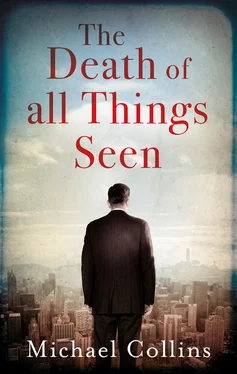*
They found him — that is, Saul’s men found him — in the closet. It took a matter of an hour, a search methodically conducted room by room. He could hear their voices getting closer. He wet himself and felt a great shame in doing so.
IN A SMALL interrogation room, Mr Ahmet, Walter’s former legal counsel, stood in a threadbare suit with a missing button.
Mr Ahmet directed a guard to set a box on the metal table. As the guard did so, Mr Ahmet kept his hands midline with his body, assuming the grim prosecutorial aesthetic of a minor bureaucrat within a Kafka novel. In the folds of softer flesh around his eyes, an inky darkness showed the color of tea leaves. He was of some indeterminate immigrant stock, the Middle or Far Eastern, anywhere from Turkey to Uzbekistan. His receding hairline revealed a high, shiny forehead the color of walnut.
When the box was put down, Mr Ahmet thanked the guard. The door opened and closed again. When Mr Ahmet sat, he drew close to the table and introduced himself. He had been legal counsel to the officers accused in the alleged murder of two drug dealers. He had known Walter Price very, very well, right from the beginning of the case and on through the years.
It turned out that it had been Mr Ahmet’s longest and most complex case, a watershed case when the city was beginning to change in its view of how policing was conducted. He explained it, how he had been hired because of civil rights advances and affirmative action. He was of that generation just past the great sweep of change and all those who came before. It was what interested him in the law, how righteousness could eventually prevail.
He was given to a moment of self-reflection and, shaking his head, said how the years had passed, and so quickly.
Mr Ahmet continued talking. He had made a great many friends in defending those who needed defending on the force. It had been his honor, advising and helping with the case. He stated it like he was giving a sworn testament on the record. He was, in some respects, the most unlikely of allies, his swarthy figure, his diminutive presence suggesting the tokenism of the era, but he took men as they came.
The system, yes, it was corrupt, or had been, rife with a demoralizing cronyism. He understood it. This was not akin to conceding one’s lack of awareness of all that went on around him, but they were the times, and a man had a right to survive as best he might and to make compromises. He was, he declared, without prejudice. He understood the ways of the world. It was important to understand a man’s motivations in all matters and proceed from there. He talked like legal counsel.
His long index finger touched the desk as he enumerated points along a history of his career and his own principles. He was a communicator, but, equally, a listener. His voice held a directness that suggested English was not his first language, not for the paucity of what was expressed, but in how he expressed himself. He came upon words, chose them. He was forthright and direct and spoke in complete sentences. It was a soothing sort of voice that could lull children to sleep.
Mr Ahmet stopped abruptly. He rattled a wet cough, dislodged something, which he turned in his mouth and then swallowed. His eyes were glossed. It took a moment. His breath was a pant. It was obvious he was sick. He recovered and, apologizing, raised his hand, then searched his inside pocket. He retrieved a pair of wire-rimmed glasses, put them on, the wire around the left ear and then the right, his eyes so magnified that he looked like an insect.
He seemed intent on sifting through the box, though he said, without looking up, ‘I must tell you, I just learned this morning that the Daniel Einhorn you contacted with your letter, he is missing.’
Mr Ahmet stopped a moment, his hand on a file in the box. ‘Mr Einhorn’s lawyer, he called 911. The situation, I believe, was quite desperate. Federal prosecutors were ready to indict Mr Einhorn for a Ponzi scheme running into tens of millions. Regrettably, these are the times we live in. There are many like him, these swindlers, but of course, so many more victims. The police are not long arrived from what I gather, but Mr Einhorn is gone. The police interviewed Mrs Einhorn. She was at the house but she alleges that she heard nothing.’
Mr Ahmet shifted and leaned back from the box and, in so doing, removed his glasses with a slow deliberateness as he looked directly at Norman. ‘Can you imagine, Mr Price, living in a house so big your own wife does not know where you are? My wife, she would love a house as big as this Daniel Einhorn’s. But everything comes at a cost, I tell her, and yet she would have it anyway if she had the chance.’
Mr Ahmet held Norman’s stare. ‘I am almost certain this Mr Einhorn has come to great harm. There is a story there somewhere. Maybe you can write it?’
Norman said curtly, ‘I don’t write crime stories.’ Then he qualified his remark. ‘I don’t deal in bodies… in a body count.’
He might have stopped there, but there was something grandiose and blusterous about him, and despite the situation, despite knowing why Mr Ahmet was actually there, he added, ‘As a writer, I am in search of a suspicion of happiness.’
The remark seemed to delight Mr Ahmet, who smiled and said, ‘Ah, yes, I am aware of your talents .’
Mr Ahmed’s myopic eyes were still fixed on Norman. His eyebrows moved of their own accord. ‘If I may suggest it, Mr Price, you should meet my sister-in-law at some point. She is the one in the family with the brains, and she will make a thing complicated when it need not be. She is a Mr Woody Allen fan. She likes the sort of movie you describe, where there’s “a suspicion of happiness…” She likes unease. She has been through two husbands and many more lovers. She is a scandalous, beautiful and very independent woman. It seems little satisfies her, but I have said to her that I believe bad conscience is always tied to bad acts. As proof, I said to her, what this Mr Woody was alleged to have done, sleeping with his daughter, or the adopted daughter of his wife, whatever, something quite despicable. I said to her what I sensed about Mr Woody, this man with the twitching face of a watchmaker’s son, that if you can make your pathology and insights into something others want to pay to see, that’s a definition of a kind of art. There are many ways to proceed in life.’
Norman flushed. ‘If this is about me being gay…’
Mr Ahmet laughed. ‘Please, Mr Price. In my homeland, we invented the fucking of goats. It was our national pastime. You cannot scandalize me, but this is the problem your father talked about, your perception that the world is against you. I will be honest with you, if I may. I went to see your show for myself, and what I believe is that all artists should know the story of others as much as their own. As legal counsel, this is what I am tasked with every day. Where are your sympathies for others, I ask you, Mr Price? I am not a critic, but you cannot dig half a hole. That is what I suspect you have been digging all these years! We must have the entire story Mr Price!’
The accusation had the sting of truth, the second time in a few days that Norman had been chastised for an apparent shortcoming, his lack of understanding of life around him.
‘Your father, I will tell you, was a friend. We discussed you often. If I may have your attention a moment, Mr Price, this might be of use to you in your writing. I might tell you about real discrimination. It will take but a moment.’
He didn’t wait for Norman’s permission.
‘My parents and I, we are immigrants. When we arrived first in Chicago, we found the Irish, the Italians and the Poles had it sewn up between them. The Irish and their famine, it is known the world over what they suffered, yet they held power like they had never known hardship. America was not what my parents had expected, but they had lived through the alternative. We left our country on the backs of donkeys, Mr Price. I swear it.’
Читать дальше












